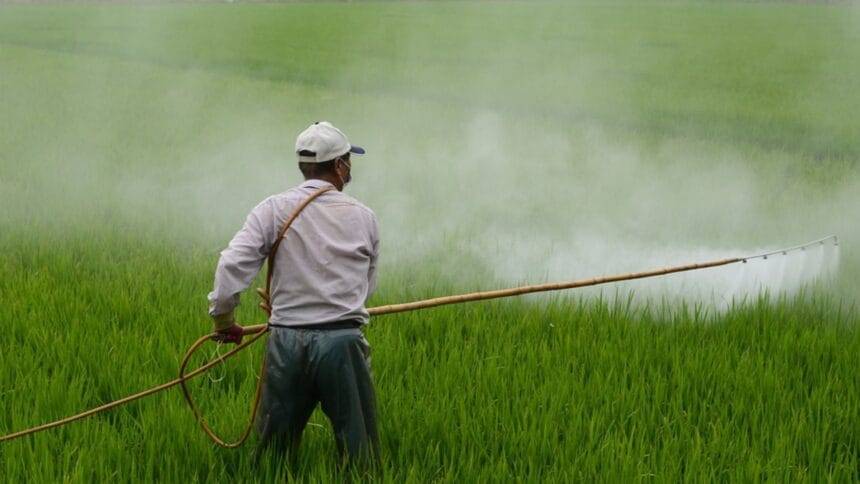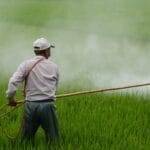Main Points In Hindi (मुख्य बातें – हिंदी में)
-
केआरबीएल लिमिटेड का पैकेट रिकॉल: केआरबीएल लिमिटेड ने स्वास्थ्य संबंधी जोखिमों के कारण अपने बासमती चावल के एक बैच को वापस बुलाया है, जिससे किसानों को संकट का सामना करना पड़ रहा है।
-
भावों में गिरावट: पंजाब में धान की कई किस्मों, विशेष रूप से बासमती 1509, की कीमतें पिछले वर्ष के स्तर 3,500-3,600 रुपये प्रति क्विंटल से गिरकर 2,600-3,000 रुपये प्रति क्विंटल के नीचे पहुंच गई हैं, जिससे किसान चिंतित हैं।
-
निर्यात में कमी और भूराजनीतिक तनाव: ईरान जैसे प्रमुख आयातक देशों से कम मांग और वैश्विक भूराजनीतिक तनाव के कारण भारतीय बासमती चावल के निर्यात में कमी आई है, जिससे घरेलू बाजार पर दुष्प्रभाव पड़ रहा है।
-
सरकार की भूमिका: किसान सरकार से हस्तक्षेप की मांग कर रहे हैं ताकि उचित मूल्य सुनिश्चित किया जा सके और व्यापारियों की मनमानी को रोका जा सके, जो उन्हें कम कीमत पर चावल बेचने के लिए मजबूर कर रहे हैं।
- भविष्य की चिंताएं: बासमती चावल का निर्यात पंजाब की अर्थव्यवस्था के लिए महत्वपूर्ण है, लेकिन बढ़ती लॉजिस्टिक लागत और अंतर्राष्ट्रीय मांग की कमी किसानों पर वित्तीय बोझ बढ़ा रही है।
Main Points In English(मुख्य बातें – अंग्रेज़ी में)
Here are 4 main points from the provided text:
-
KRBL Recall and Health Concerns: KRBL Limited, one of the world’s largest basmati rice exporters, has recalled a batch of its "India Gate Pure Basmati Rice" due to the detection of harmful pesticides exceeding permissible limits. This recall has raised potential health risks, particularly affecting kidney and liver functions.
-
Panjab Farmers in Crisis: Punjab farmers are facing significant challenges as their rice crop, particularly the Basmati 1509 variety, is either not being sold or is being sold at drastically reduced prices. Prices have dropped from last year’s ₹3,500-3,600 per quintal to between ₹2,600-3,000 per quintal, leading to farmer dissatisfaction and financial strain.
-
Impact of Export Policies and Global Tensions: The fall in prices is exacerbated by the Indian government’s imposition of a minimum export price (MEP) earlier this year, alongside geopolitical tensions, especially the conflict between Israel and Iran, which has reduced orders from major importers like Iran. Farmers now have to rely heavily on the domestic market, where prices are significantly lower than before.
- Call for Government Intervention: Farmers and local representatives are urging government intervention to ensure fair pricing and support for basmati farmers. They express concerns about being at the mercy of private traders and exporters, who are taking advantage of the situation by buying at low prices and selling at much higher rates. The importance of maintaining and promoting basmati rice exports is also highlighted due to its economic value and its contribution to water conservation efforts in Punjab.


Complete News In Hindi(पूरी खबर – हिंदी में)
जैसे ही केआरबीएल रिकॉल को संभालता है, पंजाब के किसानों को संकट का सामना करना पड़ता है, धान की फसलें नहीं बिकती हैं या काफी कम कीमतों पर बेची जाती हैं।
चंडीगढ़: दुनिया के सबसे बड़े बासमती चावल निर्यातकों में से एक और इंडिया गेट ब्रांड के निर्माता केआरबीएल लिमिटेड ने कीटनाशकों, थियामेथोक्साम और आइसोप्रोटुरोन को अनुमेय सीमा से अधिक पाए जाने के बाद अपने “इंडिया गेट प्योर बासमती चावल फेस्ट रोज़ाना सुपर वैल्यू पैक (10% अतिरिक्त)” को वापस ले लिया है। ये रसायन संभावित स्वास्थ्य जोखिम पैदा करते हैं, विशेषकर गुर्दे और यकृत के कार्यों के लिए। रिकॉल जनवरी 2024 में पैक किए गए एक किलोग्राम के पैकेट को प्रभावित करता है, जिसकी समाप्ति तिथि दिसंबर 2025 है। जबकि केआरबीएल रिकॉल का प्रबंधन करता है, पंजाब में किसानों को संकट का सामना करना पड़ता है। धान की फसल या तो मंडियों से उठ नहीं रही है या फिर काफी कम दाम पर बिक रही है. बासमती 1509 किस्म, जो पंजाब की चावल अर्थव्यवस्था का एक महत्वपूर्ण हिस्सा है, पिछले साल के 3,500-3,600 रुपये प्रति क्विंटल की तुलना में घटकर 2,600-3,000 रुपये प्रति क्विंटल रह गई है, जिससे किसान निराश हैं।
केआरबीएल ने स्पष्ट किया कि रिकॉल केवल एक बैच तक ही सीमित था। एक प्रवक्ता ने कहा, “समस्या का पता चलने पर, हमने बैच की पहचान की और उसे वापस बुलाने की पहल की। हम उच्चतम गुणवत्ता मानकों को बनाए रखने के लिए अपनी उचित परिश्रम प्रक्रियाओं को मजबूत कर रहे हैं।” कंपनी ने कहा कि कीटनाशक नियंत्रण खेत स्तर पर होता है, और वे थियामेथोक्सम और आइसोप्रोट्यूरॉन जैसे रसायनों के उपयोग को कम करने के लिए किसानों और नियामकों के साथ काम कर रहे हैं।
पंजाब के धूरी में केआरबीएल की प्रमुख चावल मिल, इसकी आपूर्ति श्रृंखला का एक महत्वपूर्ण हिस्सा है, जो घरेलू और निर्यात बाजारों के लिए बड़ी मात्रा में बासमती का प्रसंस्करण करती है। रिकॉल के बाद, 27 सितंबर, 2024 को एनएसई पर केआरबीएल के शेयर की कीमत 1.74% गिर गई।
कीमतों में गिरावट में योगदान केंद्र सरकार द्वारा अगस्त 2023 में लगाई गई न्यूनतम निर्यात मूल्य (एमईपी) कैप है, जिसने बासमती निर्यात पर 1,200 डॉलर प्रति टन का न्यूनतम मूल्य निर्धारित किया है। हालाँकि एमईपी को हाल ही में हटा लिया गया था, वैश्विक अनिश्चितताएँ, विशेष रूप से इज़राइल-ईरान संघर्ष, कीमतों को कम कर रहा है। भारतीय बासमती के प्रमुख आयातक ईरान ने भूराजनीतिक तनाव के कारण इस साल कम ऑर्डर दिए हैं। एक निर्यातक ने गुमनाम रूप से बोलते हुए, ईरान और अन्य मध्य पूर्वी देशों के साथ व्यापार में व्यवधान के बारे में चिंता व्यक्त की, जो राजस्व को गंभीर रूप से प्रभावित कर सकता है। “ईरान को निर्यात के बिना, हमें घरेलू बाजार पर निर्भर रहना चाहिए, जहां बासमती को प्रीमियम कीमतें नहीं मिलती हैं। यह अनिश्चितता हमें किसानों को कम कीमत देने के लिए मजबूर कर रही है, ”निर्यातक ने समझाया।
अमृतसर के शैंकी सिंह जैसे किसान परेशानी महसूस कर रहे हैं। “पिछले साल, मैंने अपनी बासमती 1509 3,650 रुपये प्रति क्विंटल पर बेची थी। आज, मुझे 2,600 रुपये से समझौता करना पड़ा,” उन्होंने अफसोस जताया। अन्य किसानों ने भी इसी तरह की भावना व्यक्त की है क्योंकि कीमतें चार साल के निचले स्तर पर पहुंच गई हैं। अमृतसर की भगतांवाला मंडी में बासमती 1509 के लगभग 42 लाख बैग आने के बावजूद, निर्यात बाजार की अनिश्चितताओं के कारण कीमतें कम बनी हुई हैं।
पंजाब अनाज मंडी मजदूर यूनियन के अध्यक्ष राकेश तुली ने इस बात पर प्रकाश डाला कि बासमती चावल की खरीद सरकार द्वारा नहीं की जाती है, जिससे किसानों को निजी व्यापारियों और निर्यातकों की दया पर छोड़ दिया जाता है। उन्होंने कहा, “कीमत अंतरराष्ट्रीय मांग से तय होती है, और घरेलू खपत 10% से कम होने पर, निर्यात की संभावनाएं कमजोर होने पर व्यापारियों के लिए अधिक भुगतान करने के लिए बहुत कम प्रोत्साहन होता है।”
किसान सरकार से हस्तक्षेप करने का आग्रह कर रहे हैं, उनका दावा है कि व्यापारी कम कीमतों पर बासमती खरीदकर और इसे बहुत अधिक दरों पर दोबारा बेचकर स्थिति का फायदा उठा रहे हैं। अमृतसर मंडी के किसान हरमिंदर सिंह ने कहा, “सरकार को उचित मूल्य सुनिश्चित करना चाहिए। हमारा शोषण किया जा रहा है।”
कपूरथला से विधायक राणा गुरजीत सिंह ने केंद्र और राज्य दोनों सरकारों से पंजाब के बासमती किसानों का समर्थन करने का आह्वान किया है। उन्होंने किसानों को पानी की अधिक खपत वाली फसलों की बजाय बासमती फसलों की ओर धकेलने के लिए राज्य की आलोचना की, जिससे कीमतें गिर गईं। “सरकार ने गैर-धान फसलों का समर्थन करने के लिए एक कोष बनाने का वादा किया था। अब जब किसान विविध हो गए हैं, तो सरकार के लिए कार्रवाई करने का समय आ गया है, ”उन्होंने कहा।
सिंह ने निर्यात को सुविधाजनक बनाने के लिए कृषि और प्रसंस्कृत खाद्य उत्पाद निर्यात विकास प्राधिकरण (एपीडा) से भी आग्रह किया। बासमती के निर्यात से सालाना अनुमानित 48,000 करोड़ रुपये की आय होती है और यह पंजाब के जल संरक्षण प्रयासों के लिए महत्वपूर्ण है। हालाँकि, बढ़ती लॉजिस्टिक लागत और मध्य पूर्व से कम ऑर्डर के कारण, बासमती किसान भारी वित्तीय तनाव में हैं।
ईरान, जो आम तौर पर सालाना लगभग 4 लाख टन बासमती का आयात करता है, ने इस साल केवल 1 लाख टन का ऑर्डर दिया है, जिससे कीमतों में और गिरावट आई है। इजराइल-ईरान संघर्ष ने जटिलताओं को और बढ़ा दिया है। “किसानों को संकटपूर्ण कीमतों पर बेचने के लिए मजबूर किया जा रहा है। सरकार को आगे आना चाहिए और सहायता प्रदान करनी चाहिए, ”सिंह ने कहा। बासमती की कीमतें अब लगभग 3,300 रुपये प्रति क्विंटल हैं, जो पिछले साल से 2,000 रुपये कम हैं।
Complete News In English(पूरी खबर – अंग्रेज़ी में)
As KRBL handles the recall, farmers in Punjab are facing a crisis, with rice crops either not selling or being sold at very low prices.
Chandigarh: KRBL Limited, one of the world’s largest basmati rice exporters and the maker of the India Gate brand, has recalled its “India Gate Pure Basmati Rice Fest Daily Super Value Pack (10% extra)” after finding pesticide residues of Thiamethoxam and Isoprocarb above the permissible limits. These chemicals pose potential health risks, especially to kidney and liver functions. The recall affects one-kilogram packets packed in January 2024, which expire in December 2025. While KRBL manages the recall, farmers in Punjab are struggling, as their rice harvests are either not being picked up from the markets or are being sold at very low prices. The Basmati 1509 variety, crucial to Punjab’s rice economy, has seen prices drop to 2,600-3,000 rupees per quintal from last year’s 3,500-3,600 rupees, leaving farmers disappointed.
KRBL clarified that the recall is limited to just one batch. A spokesperson stated, “Upon discovering the issue, we identified the batch and took steps to recall it. We are strengthening our due diligence processes to maintain the highest quality standards.” The company added that pesticide control occurs at the farm level, and they are working with farmers and regulators to reduce the use of chemicals like Thiamethoxam and Isoprocarb.
KRBL’s main rice mill in Dhuri, Punjab, is a key part of its supply chain, processing large quantities of Basmati for both domestic and export markets. After the recall, KRBL’s share price fell by 1.74% on the NSE on September 27, 2024.
The drop in prices is also influenced by the minimum export price (MEP) cap imposed by the central government in August 2023, which set a minimum price of $1,200 per ton for Basmati exports. Although the MEP has recently been lifted, global uncertainties, especially the Israel-Iran conflict, are keeping prices low. Iran, a major importer of Indian Basmati, has placed fewer orders this year due to geopolitical tensions. An exporter, speaking anonymously, raised concerns about disruptions in trade with Iran and other Middle Eastern countries, which could severely impact revenue. “Without exports to Iran, we have to rely on the domestic market, where Basmati does not fetch premium prices. This uncertainty forces us to pay farmers less,” the exporter explained.
Farmers like Shanky Singh from Amritsar are feeling the pinch. “Last year, I sold my Basmati 1509 for 3,650 rupees per quintal. Today, I had to settle for 2,600 rupees,” he lamented. Other farmers have expressed similar feelings, as prices are at a four-year low. Despite approximately 4.2 million bags of Basmati 1509 arriving at the Bhagatwala market in Amritsar, prices remain low due to uncertainties in the export market.
Rakesh Tuli, president of the Punjab Grain Market Workers Union, highlighted that the government does not purchase Basmati rice, leaving farmers at the mercy of private traders and exporters. He stated, “Prices are determined by international demand, and with less than 10% domestic consumption, weak export prospects provide little incentive for traders to pay more.” Farmers are urging the government to intervene, claiming that traders are taking advantage of the situation by buying Basmati at low prices and reselling it at much higher rates. Amritsar market farmer Harminder Singh said, “The government should ensure fair prices. We are being exploited.”
Rana Gurjeet Singh, an MLA from Kapurthala, has called on both the central and state governments to support Punjab’s Basmati farmers. He criticized the state for encouraging farmers to grow water-intensive crops instead of Basmati, which has led to falling prices. “The government had promised to create a fund to support non-paddy crops. Now that farmers have diversified, it’s time for the government to take action,” he noted.
Singh also urged the Agricultural and Processed Food Products Export Development Authority (APEDA) to facilitate exports. Basmati exports generate an estimated income of 48,000 crores annually and are crucial for Punjab’s water conservation efforts. However, rising logistics costs and fewer orders from the Middle East are putting Basmati farmers under severe financial stress.
Iran, which typically imports around 4 lakh tons of Basmati annually, has only ordered 1 lakh tons this year, further driving down prices. The Israel-Iran conflict has added to the complications. “Farmers are being forced to sell at distress prices. The government needs to step in and provide assistance,” Singh expressed. Basmati prices are currently around 3,300 rupees per quintal, which is 2,000 rupees lower than last year.




